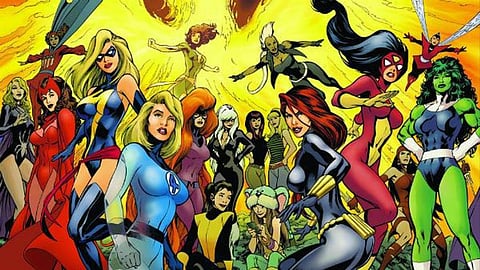
- Home
- NewsGram USA
- India
- न्यूजग्राम
- World
- Politics
- Entertainment
- Culture
- Lifestyle
- Economy
- Sports
- Sp. Coverage
- Misc.
- NewsGram Exclusive
- Jobs / Internships

By Atul Mishra
What does a Black Widow bring to the table? What's Scarlett Johansson's reel role in The Avengers? Is Rachel of Dark Knight a damsel in distress? Where is Spiderwoman or Batwoman? We hear of the superheroes, but we don't often hear about super-heroines. There have been all those men like Batman, Superman and Spiderman. Why didn't anybody (and hasn't hitherto) write or film women like Batwoman, Superwoman or Spiderwoman?
The phallocentric divide rivers down to a profit-loss statement. This happens in the film fraternity as well. Some characters have phallus, others don't. The ones who don't are aces in the deck of film cards, merely there to sexualize the script.
This has been perpetually present in the movies as well. There have been many female characters alongside our superheroes merely to facilitate the script and monetary credentials attached with the fraternity. As Gayatri C. Spivak asks, "Can the subaltern speak?" The reality of these female characters is that they are subalterns. They don't really have a voice. Rachel in Batman is a damsel in distress, defined only by her relationships with the men in movie. Mary Jane in Spiderman has to be saved by his Man like the Castle of Otranto. There is a lack of agency attached with the female characters which make them subjugated when juxtaposed with larger than life superheroes. So why have these characters? Probably the Irigaray argument comes into play here that non-phallic human characters are a tool of transaction. Giving a physical reality to these characters like say Scarlett Johansson playing the Black Widow is a way to glue audiences to their seats. No doubt sexuality is the most appealing thing in a heteronormative hegemonic patriarchal culture. The result of this discourse then weakens the already weak character and the actor. But the magic of physicality and sexuality still works on the screen.
Drawing along these feminist lines, Bechdel test comes into mind. As a fact, any fictional work that has at least two female characters who talk about something other than man passes the Bechdel test. Most of the superhero movies fail this test. A few like Thor and Catwoman just passed but most of the others including Spiderman series, Batman series, Avengers and Hulk have failed the Bechdel test.
Even the movie posters have the male machismo angle attached to them. All the theatrical posters of superhero movies have those hulky-bulky-clad-in-a-particular-glaring-costume heroes. The females are subjugated even in the posters let alone the screen and script. So the stern and gloomy reality check of the portrayal of female characters in superhero movies is that first there are dominantly only superheroes and not super-heroines and moreover the grim echelon ascends due to the realization of weak female characters portrayed alongside the Achilles of silver screen.
Laura Mulvey, the British feminist film theorist, says- "In film, women are typically the objects, rather than the possessors, of gaze because the control of the camera (and thus the gaze) comes from factors such as the assumption of heterosexual men as the default target audience for most film genres. Women are the bearer of meaning, not the maker of meaning."
All this portrayal is also mainly because most of the superhero films have been directed by male directors, be it Niblo and Reed's The Mark of Zorro or upcoming Snyder's Dawn of Justice. So superhero films are actually men's stories with hyper-sexualized women's stories which make the latter a bearer of meaning and not its maker. The female portrayal can be seen as "women in refrigerators" and one of the stark contemporary examples is Rachel of The Dark Knight where she is murdered for the male's storyline to progress and catapult the rage of male characters.
